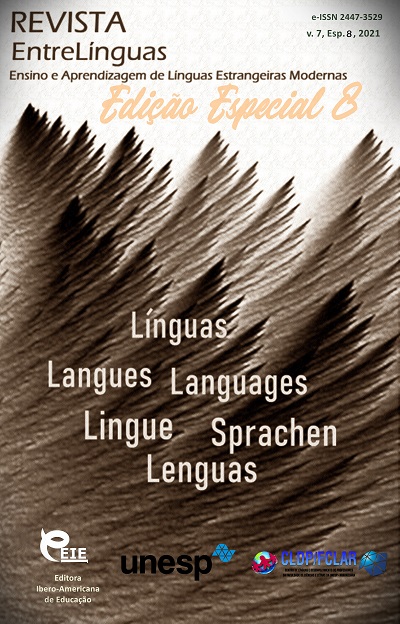Características lexicais da língua turca moderna: técnicas instrucionais de introdução do vocabulário nas aulas de língua turca e erros típicos na fala dos alunos
DOI:
https://doi.org/10.29051/el.v7iesp.8.16356Palavras-chave:
Unidade lexical, Métodos de ensino, A língua turca, Erros típicos, DiscursoResumo
A relevância do problema em pesquisa é determinada pela necessidade de aperfeiçoar os métodos de ensino da língua turca para estudantes universitários. O objetivo do artigo é caracterizar profundamente os traços lexicais da língua turca e analisar as técnicas de ensino de prefácio de material lexical nas aulas de língua turca para estudantes universitários. A abordagem principal para o estudo desse problema é um avanço problema-temático. As principais conclusões da pesquisa são a sistematização dos traços lexicais da língua turca, a análise lexical de erros típicos na fala de alunos no estágio original de aprendizagem da língua turca. Os elementos básicos da metodologia de estudo da língua turca pelos alunos em universidades russas foram apresentados. O método de trabalho com unidades lexicais da língua turca no auditório do aluno foi projetado. Uma visão geral dos erros típicos cometidos pelos alunos durante o aprendizado de uma unidade lexical turca foi apresentada. Os materiais do artigo podem ser úteis para o ensino da língua turca em universidades da Federação Russa, realizando também experimentos para testar a eficácia desses avanços metodológicos, bem como desenvolver tarefas mais eficazes para formar boas habilidades de falar turco.
Downloads
Referências
BIM, I.L. (1977). Language Teaching Methods as the Science and the Problems of School Textbook. Moscow: The Russian Language,354 p.
KHARISOV, F.F. (1999). Tatar Spoken Language Teaching. Kazan: Magariph.,342 p.
LEONTIEV, А.А. (1988). Psychological Background of Early Language Acquisition, Foreign Languages in School, №5. Moscow, p.24-29
RAZUMOVSKAYA, R.N. (1948). The Mistakes Made by Students in Foreign Language (based on the material of the English Language), Foreign Languages in School, № 3. Moscow, p.68
SHAFIGULLINA, L. Sh. (2011). Didactic conditions of development of foreign language speech activity of students of pedagogical universities in the initial phase: PhD thesis. Kazan:TGGPU,144 p.
SHAFIGULLINA, L.Sh. (2006). Development of foreign speech activity in students of pedagogical higher school. Kazan: School,522p.
SIGUAN, М., MCKEE, Ch.F. (1990). Education and Bilingualism. Moscow: Pedagogics., 380 p.
SOKOLOV, S.А. (1971). Functional and semantic analysis of the word "bir" and its derivatives in the Turkish language, Turkic Lexicology and Lexicography. Moscow., p. 282-290.
STAROSTOV, L.N. (1953). Turkish Teaching Methods at Initial Stage of Learning: Diss. … cand. of pedagogy .Moscow., p.398
TSVETKOVA, Z.М. (1949). About language teaching in high school (p.13-14). Moscow., 420p
Downloads
Publicado
Como Citar
Edição
Seção
Licença

Este trabalho está licenciado sob uma licença Creative Commons Attribution-NonCommercial-ShareAlike 4.0 International License.
Os manuscritos aceitos e publicados são de propriedade da Revista EntreLínguas. Os artigos publicados e as referências citadas na Revista EntreLínguas são de inteira responsabilidade de seus autores.
Transferência de direitos autorais – autorização para publicação
Caso o artigo submetido seja aprovado para publicação, já fica acordado que o(s) autor(es) autoriza(m) a UNESP a reproduzi-lo e publicá-lo na EntreLínguas, entendendo-se os termos “reprodução” e “publicação” conforme definição respectivamente dos incisos VI e I do artigo 5° da Lei 9610/98. O artigo poderá ser acessado pela rede mundial de computadores (Internet), sendo permitidas, a título gratuito, a consulta e a reprodução de exemplar do artigo para uso próprio de quem a consulta, desde que haja a citação ao texto consultado. Essa autorização de publicação 328 EntreLínguas, Araraquara, v. 1, n .2, p. 323-328, jul./dez. 2015 não tem limitação de tempo, ficando a UNESP responsável pela manutenção da identificação do(s) autor(es) do artigo. Os artigos publicados e as referências citadas na Revista EntreLínguas são de inteira responsabilidade de seus autores.











